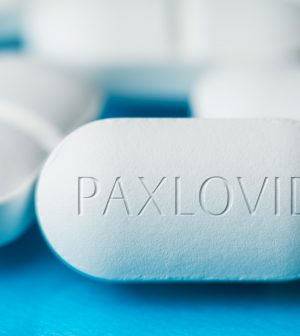- Could Your Grocery Store Meat Be Causing Recurring UTIs?
- Are You Making This Expensive Thermostat Error This Winter?
- Recognizing the Signs of Hypothyroidism
- 10 Strategies to Overcome Insomnia
- Could Artificial Sweeteners Be Aging the Brain Faster?
- Techniques for Soothing Your Nervous System
- Does the Water in Your House Smell Funny? Here’s Why
- Can a Daily Dose of Apple Cider Vinegar Actually Aid Weight Loss?
- 6 Health Beverages That Can Actually Spike Your Blood Sugar
- Treatment Options for Social Anxiety Disorder
COVID Rebound Not Limited to Those Who Took Paxlovid

COVID rebound, which struck both President Joe Biden and White House Chief Medical Advisor Dr. Anthony Fauci recently, doesn’t just happen in those who take Paxlovid, a new study finds.
Rebound symptoms were spotted in 27% of COVID-19 patients who hadn’t taken the antiviral pill, with about 12% testing positive again, researchers report.
“It happens all the time. People who are untreated with COVID who then feel better can get symptoms afterward,” study co-author Dr. Davey Smith, chief of infectious diseases and global public health at the University of California, San Diego School of Medicine, told NBC News.
The study has not yet been published in a peer-reviewed journal.
Earlier this week, White House COVID-19 coordinator Dr. Ashish Jha said Paxlovid rebounds happen in 5% to 8% of patients. During a trial conducted by drug maker Pfizer, only 1% to 2% of those taking the antiviral pills later tested positive again, but so did a similar rate in the placebo group.
Smith did say he was surprised that the numbers of people untreated with an antiviral were actually as high as the study found. Symptoms could return for anyone and could be worse than the initial symptoms or milder.
“It’s just the variability in the natural course of the infection,” Smith explained.
“In some ways, that’s the natural history of all respiratory viral infections,” Dr. Paul Sax, clinical director of the division of infectious diseases at Brigham and Women’s Hospital in Boston, told NBC News. “There are good days and bad days, and then they eventually get better.”
It’s still not clear whether the rebound for those who’ve used Paxlovid has anything to do with the drug.
“It could be that what would have happened without Paxlovid is that they would still have tested positive in these late days, but they wouldn’t have had the intervening negative test. … This could be just a slight disturbance in what the natural history of the illness was for them,” Sax said.
In fact, the U.S. Centers for Disease Control and Prevention warned in May that “a brief return of symptoms may be part of the natural history of SARS-CoV-2 [the virus that causes COVID-19] infection in some persons, independent of treatment with Paxlovid and regardless of vaccination status.”
Still, Dr. Albert Ko, an epidemiologist at the Yale School of Public Health, said Paxlovid is working.
“Paxlovid is doing what it’s supposed to do: prevent us from getting life-threatening COVID,” Ko told NBC News. “Even though these rebounds are happening, it’s preventing the severe outcomes.”
More information
The U.S. Centers for Disease Control and Prevention has more on COVID-19.
SOURCE: NBC News
Source: HealthDay
Copyright © 2026 HealthDay. All rights reserved.










